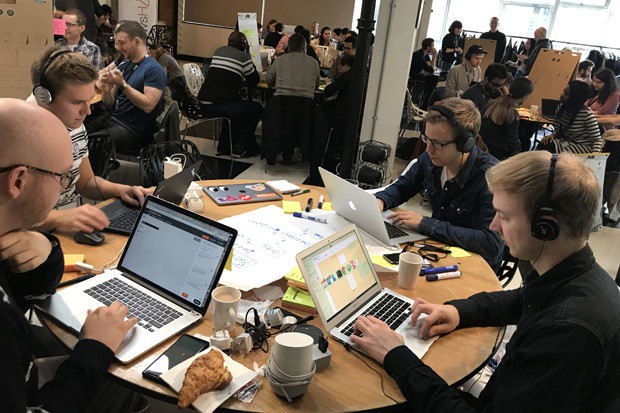In a bid to bring people in the the industry together to come up with new ideas and concepts based around the delivery of online news, the BBC holds the #newsHACK events, which are multi-disciplinary collaborations on journalism innovation.
During the events, organised by BBC News Labs and Connected Studio, journalists, developers, UX designers and other industry professionals from across Europe spend two days working on a set brief. In teams, they tackle issues ranging from automated transcription to language technology.
Alli Shultes, engagement producer at BBC News Labs, told Journalism.co.uk that the event is designed as an opportunity for focused digital innovation.
"When we are planning these challenges, we look at the media landscape and think what news organisations are experimenting with, what common challenges are they trying to solve, and what would be a useful topic for people to brainstorm around," she said in a recent podcast.
"The BBC has this idea that we should be driving innovation across the industry, to facilitate these networking and collaboration events to share our work and generate new ideas with others."
The first #newsHACK took place in October 2013 in London, and has traveled around the world to places including Nairobi, Glasgow and Cape Town. The latest event was held in London and kicked off MozFest week.
The most recent #newsHACK focused on conversational user interfaces, asking 13 teams to re-imagine what interactions with the news could look like on platforms such as Facebook Messenger, WeChat and Line, and on voice devices like Google Home and Amazon Echo.
Participants were able to submit prototypes in one of three categories: editorial tools that help produce content for conversational interfaces; unique audience experiences for conversational platforms or products; and 'Surprise us', for unique prototypes and ideas.
Our #newsHACK participants thought up new ways of storytelling with voice devices & messaging bots. Here's a roundup https://t.co/KcgyDapizs pic.twitter.com/tj0a3QrLOP
— BBC News Labs (@BBC_News_Labs) October 30, 2017
Swedish broadcaster Sveriges Radio won the award for the best unique audience-facing experience, for developing an Amazon Echo skill that allows users to play the news and their favourite programmes, as well as save songs and radio channels and share them with friends on social media platforms.
"[#newsHack] made us realise that we are all facing the same challenges, and by working together through sharing ideas, we can speed up the development process, which will benefit our audiences," Magnus Suneson, web developer at Sveriges Radio, told Journalism.co.uk in an email.
"We will definitely implement some of our ideas into the next release of Swedish Radio's Alexa app."
A team from NRK, the Norwegian Broadcasting Corporation, received an honorable mention for their work building a Norwegian-speaking Alexa, which acted as a radio alarm that offered the user short, spoken news updates based on text items previously published on its website.
"Within the tool, we built a language analysis module enabling the end user to use imprecise language about our content, for example they can say 'politics', and our system will understand that this relates to a recent article about Brexit – even if the relevant content doesn't contain precisely that word. And vice-versa," said Anders Hofseth, journalist and strategic adviser, NRKbeta.no.
"All this happened because neither Alexa nor Google Assistant speak Norwegian yet. A challenge for a small language like Norwegian is that you’re often not first in line when language is an integral part of the product.
"It is really conducive to get out of your everyday, and spend a few days in a bubble working on a single task, alongside people focusing on similar things – our #newsHACK team had a broad skillset, and we don’t work with each other on a daily basis."
Looking to get involved? The next event is scheduled for November 21-22 in London, and you can register for it on Eventbrite. Find out more about #newsHACK by listening to our podcast.
Free daily newsletter
If you like our news and feature articles, you can sign up to receive our free daily (Mon-Fri) email newsletter (mobile friendly).
Related articles
- New European journalism database facilitates cross-border collaboration
- How Reuters, Newsquest and BBC experiment with generative AI
- Standing out in a crowded market: what makes a top news podcast?
- How can UK commercial local news media respond to BBC expansion?
- European broadcasters must address on-screen diversity










